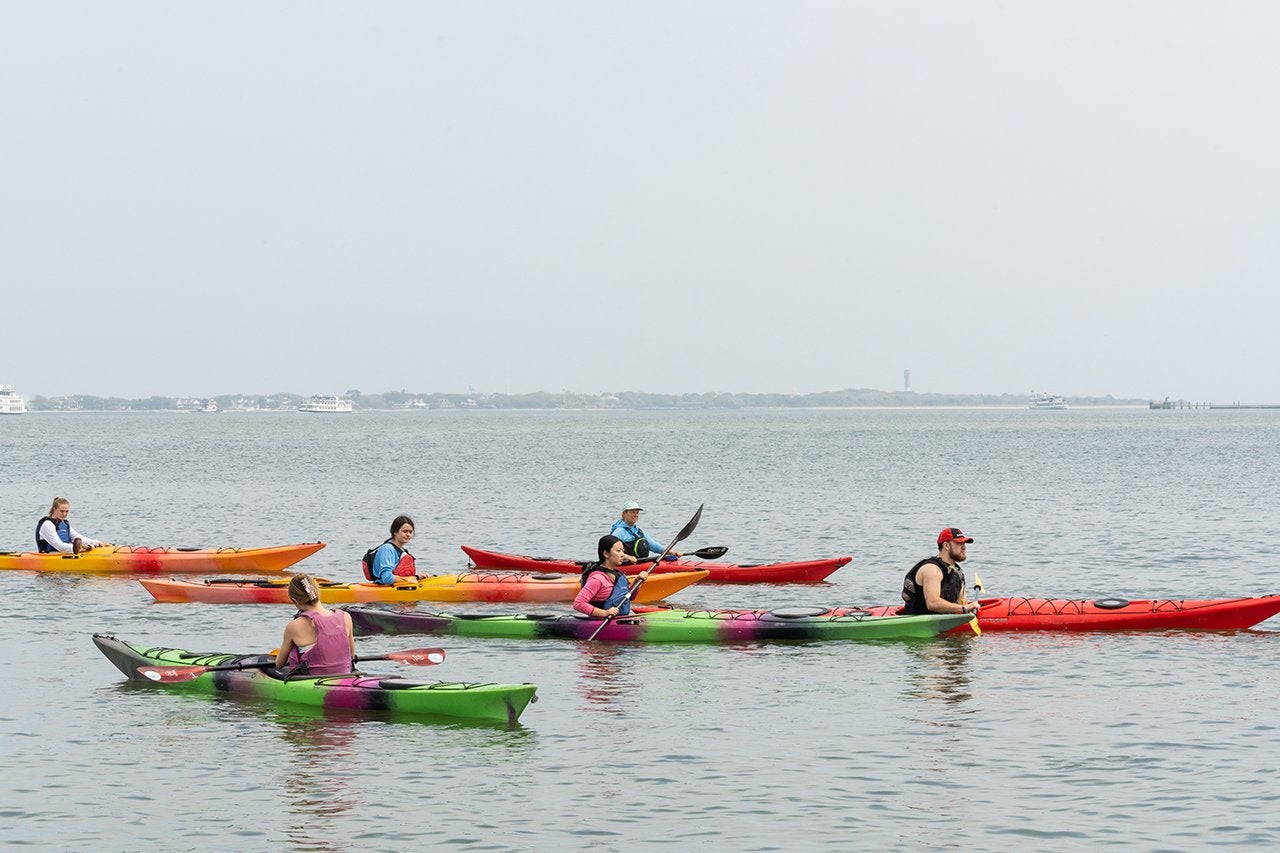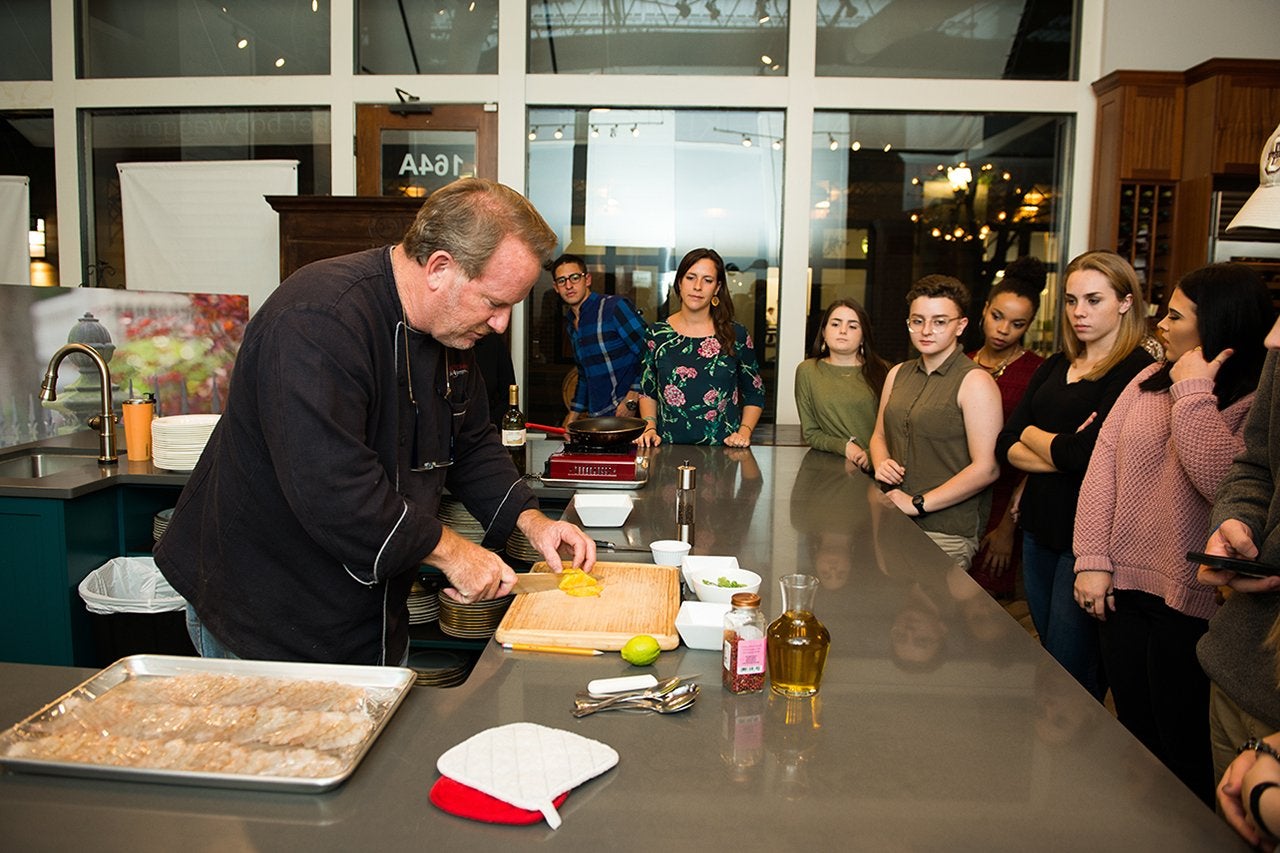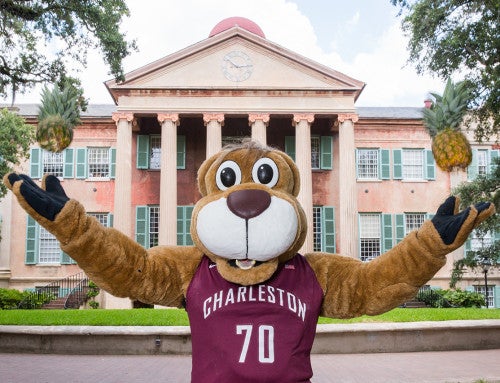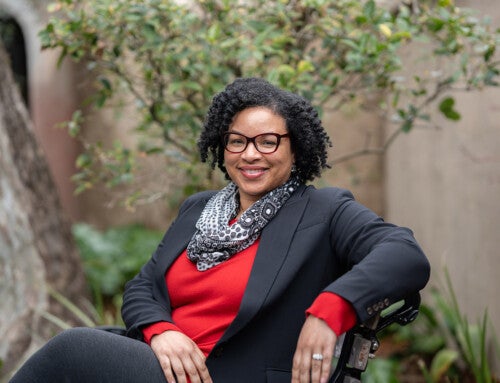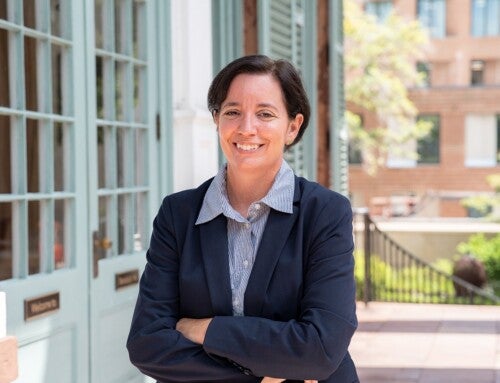CofC faculty have the opportunity to get creative and have fun when creating First Year Experiences. First image above: Adjunct professors Miranda McManus (biology) and Ashley Brown (health and human performance) combined their passions for sustainability and kayaking for students in the FYE Living Learning Community, Paddling Towards Sustainability. Second image above: Professor of Hispanic studies Sarah Owens shared her love for French cuisine with a twist by bringing the students in the FYE Latin America and the French Caribbean Living Learning Community to get some culinary experience with Chef Bob Waggoner.
We all need a little excitement every now and then – a chance to mix things up, break the routine, get creative and just have some fun. Even at work. Especially at work.
In fact, a little imagination can not only break up the monotony of work that we all feel at some point – it can reinvigorate us, remind us why we love what we do and make us better, happier and more invested employees, educators and colleagues.
That’s why Jen Wright, director of the First Year Experience, encourages all College of Charleston faculty members to create and teach an FYE course every once in a while.
“The FYE program is designed to be an opportunity for faculty to have a little fun, think outside their usual classes and dig into the ‘special topics’ they’re interested in,” she says, adding that – because FYE courses don’t have to go through the formal college-level course approval process – they allow faculty to get imaginative. “FYE courses give faculty a freedom that they might not otherwise have and push them to think of creative ways to teach their subjects and weave their own interests into the curriculum. It gives a fresh perspective to their subject – which engages them and their students.”
Engaging students, of course, is what the College’s FYE program is all about.
“That’s the essence of it – to provide resources for all first-year students and help them find their place at the College,” says Wright. “But it’s also an opportunity for faculty to build relationships with students as soon as they get to the College.”
Because the FYE class is among the first college-level classes most first-year students have taken, connecting with them at such an early stage in their CofC experience can have a huge impact.
“For faculty, it’s an opportunity to introduce incoming students to ideas, topics and subjects they didn’t realize they wanted to learn about,” says Wright. “For students, it’s where they might realize that their real interests aren’t what they expected – where they discover what they want to do with their lives. And it’s really exciting to be a part of that.”

Adjunct professors Miranda McManus (biology) and Ashley Brown (health and human performance) combined their passions for sustainability and kayaking in the FYE Living Learning Community, Paddling Towards Sustainability.
With small class sizes and an emphasis on support systems, the FYE program doesn’t just integrate first-year students into campus life and support their early academic success; it promotes their emotional health and wellbeing and gives them a sense of community beyond the classroom.
And – with the professional development workshops and pedagogical conversations the FYE program holds in partnership with the Center for Excellence in Teaching and Learning to discuss teaching first-year students, writing and integrating new themes across disciplines – it does the same for faculty members.
“It’s a great way to be a part of the faculty community and to develop that community on campus, too. It builds a faculty support system,” says Wright. “It creates not just great working relationships, but also friendships between faculty. It widens our support network and our field of reference. So, in that sense, it is community building.”
There are many opportunities to be a part of that community, given that all first-year students are required to take one FYE course during either the fall or spring semester of their first year at the College.
“We’re always looking for faculty interested in teaching first-year students – whether that’s in an interdisciplinary learning community or a seminar, the FYE needs you,” says Wright. “If you think you would enjoy it, or think they’d enjoy it, give it a try – we’re here to support you as you do.”
All you need is an idea. The FYE website includes lists of past FYE courses and upcoming FYE courses that may inspire you.

Professor of Hispanic studies Sarah Owens took students in the FYE Latin America and the French Caribbean Living Learning Community to learn some cooking techniques from Chef Bob Waggoner.
“The FYE Committee wants to hear your ideas – any and all of them,” says Wright, adding that the committee doesn’t typically reject course proposals that are submitted; rather, it provides feedback and actively works with faculty to make their course design the best it can be. “We can even help our faculty with things like finding faculty partners outside of their discipline and working with them to find a common theme, because the interdisciplinary component can be what is intimidating for some, but it’s also what’s so rewarding.
“And remember,” she continues, “you can teach the course one time, or you can come back and teach it occasionally. It doesn’t have to be a permanent commitment. We don’t want anything to discourage our faculty from taking this opportunity.”
That’s why the program provides a stipend, as well as funding for course development, guest speakers and outside events, along with other needs within the course. It’s also why faculty who are teaching their first FYE class are required to take an interactive FYE Workshop that helps them infuse first-year student pedagogies into their first-year seminars and learning communities.
Faculty also get the support from their trained peer facilitator, who teach the required non-credit–bearing Synthesis Seminars that are meant to complement the FYE course and help first-year students navigate campus, manage time and course requirements and develop skills for managing social, relational and academic stress. Peer facilitators work closely with the faculty member(s) and students in the FYE course, serving as something of a liaison and an advisor to both.
“The peer facilitators are an invaluable resource to our FYE students and FYE faculty. They are just one of many parts to the support system we have in place,” says Wright. “We’re ready to help. So, if you work with first-year students, we want to help you. If you want to work with first-year students, we want to help you. We’re here for you. We’ll figure it out. So, let’s talk, let’s see what we can do. And let’s have fun with it.”
After all, everybody needs to have a little fun from time to time. Even at work.
Faculty may submit course proposals via the First Year Experience website.
For more information about teaching FYE courses, visit the First Year Experience program website, read through the faculty FAQs or contact the First Year Experience directly.

